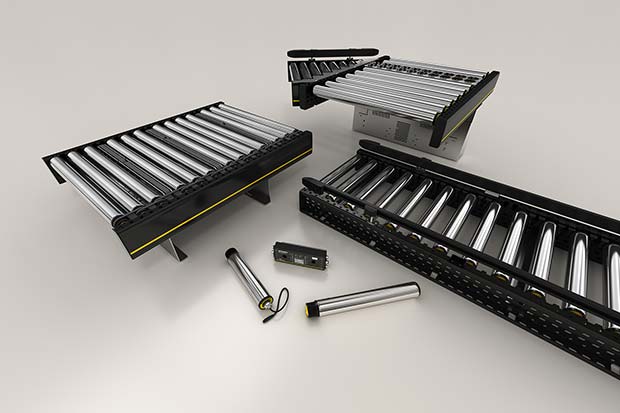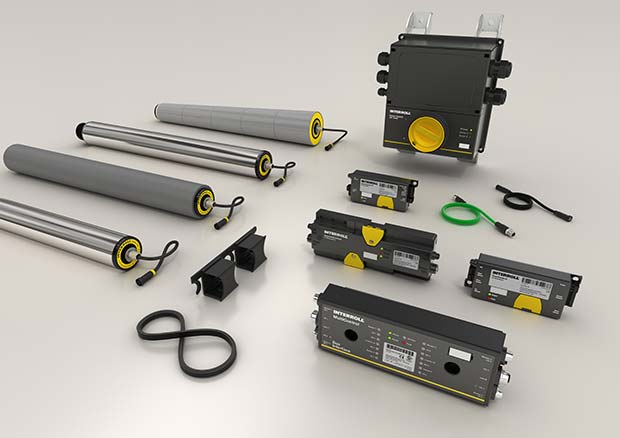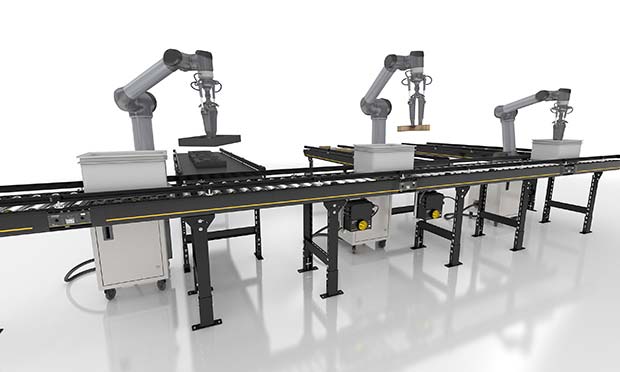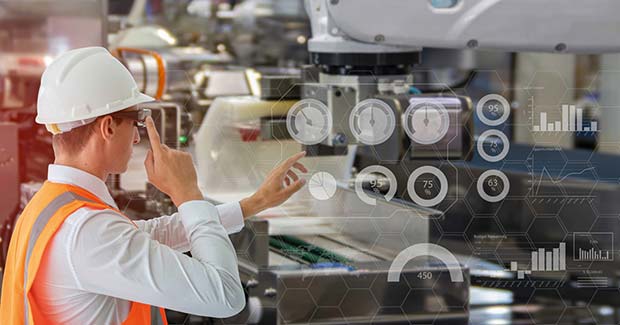Interroll is continually innovating, with recent launches including a smart pallet mover, vertical crossbelt sorter and a split tray sorter.

Managing Director, Interroll
Hilton Campbell, Managing Director, spoke to Warehouse & Logistics News to talk about the company’s plans to grow in the coming years.
Hilton, tell us about your background – how long have you been at Interroll, what roles have you had there, how long have you been in your present role?
As a Managing Director I have got a long history with Interroll, having been with them 23 years. I have seen the company grow from a medium to a medium/large size company over those 23 years. I started off my career with Interroll in South Africa, I was a founding member of the company there because we plant companies all over the world. South Africa was one of the very first countries that Interroll identified as an emerging market. I was fortunate enough to be involved from the very early stages. During my time in South Africa I filled various roles to the point where I was appointed managing director in 2012. I took over the running of the company, which is both a production and a sales company. Then the opportunity came up for me to take on my current role as Managing Director of Interroll United Kingdom and Ireland. I was excited to do that because I felt I had learned a lot in the South African company, where the market is much smaller, further away from the support of the holding office. You get to learn a lot, it’s a great way to start, at the grassroots of the business. I came to the UK in 2019.
I was educated as an industrial engineer. I have a background in materials handling, productivity, work studies and efficiency. I also have business qualifications.

How would you describe Interroll to anyone who wasn’t familiar with the company? What does the company do?
Interroll is a leading global provider of products and solutions within the materials handling sector. Our route to market is one whereby we are a partner to small, medium and large system integrators as our customers. We put the emphasis on the fact that we are global. We offer a technology platform that is modular, flexible and scalable – similar to LEGO for a range of materials handling applications centred around the key processes of picking, storing, conveying and sorting. That could be moving anything from boxes to cartons and more recently pallet handling.
Interroll is a publicly listed company. Our global footprint is something we can be particularly proud of. We present ourselves as a global company. We are very proud to closely work with some of the world’s leading integrators. These are names like Knapp and TGW. We are also focused on working with small to medium sized integrators. That is what makes our market interesting – there are needs of customers that are quite granular, small, starting off in the mechanisation and materials handling. Then there are those bigger companies like 3PL which have much larger automation needs. We touch a very broad spectrum of requirements, from small to large companies.

Which is easier to deal with – a small company or a large company?
Both are difficult. A customer is a customer. Small to medium sized companies become very dependent on Interroll, they see us as an extension of their business. We can talk a bit about a programme called Rolling on Interroll. This is a programme which we have developed not just for the UK but globally. It is designed specifically for small to medium sized companies. We have become stronger partners with these companies. The larger companies are also very dependent on us but they are using us more on a component level. We have produced rollers for 62 years. We supply a roller to the top three or four integrators in the world. The small to medium sized companies purchase a much broader spectrum of our product portfolio. They are buying the rollers, our modules, our pallet handling solutions. For a small to medium company, we have a larger share of wallet.

How has the company been performing over the last year? Is it in growth? What is driving the growth?
As a group we have been performing very well. Our results for 2020, the year of the pandemic, show we maintained our output equal to the previous year. There was a slight increase if we account for local currencies but they report our figures in Swiss francs and the franc has got quite a bit stronger. But for the sake of simplicity, we equalled our output from the previous year.
What was most encouraging was many of the orders we were expecting weren’t cancelled, they were postponed. That brought us into today’s situation where we have a huge influx of orders coming into our company which is causing quite a bit of complexity and pain.
The company has done well as a result of the boom in the e-commerce world and in courier express parcels. Any retailer from small to large that deals with an omnichannel strategy and was just dipping their toes in online retailing suddenly had to wake up to the pace of online business. Anyone that wants to deliver a product online needs a certain degree of mechanisation and automation inside their facility.
This is a core market for Interroll. It has been like that since I can remember. It’s not like we suddenly woke up and thought this is something we need to get involved in. This is an area we have been involved in for some time. Interroll was really well prepared for this. Now we are seeing the benefits. E-commerce and courier express parcels and the food and beverage sectors are continuing to invest. People are still eating and drinking.
Some of the sectors are in slower growth. We also participate in the airports industry and the automotive sector, which have slowed.

How did the Covid-19 pandemic and resulting lockdowns affect your business?
Internally we have had to think about our staff. We have had to protect our staff. Because Interroll is in many essential services sectors, we have had to make sure we can still deliver our products and services. We are still very much in need. We were affected internally but our company was well prepared so we were able to go remote very quickly. I am pleased to say we had a seamless transition from a traditional model of being in the office to having to work remotely. We were affected by that.
Our customers had to switch to a remote contact with Interroll. I can’t say we struggled, we were fortunate to adapt quite well.
What challenges has Brexit brought to Interroll’s business?
Brexit has assisted us as some of our customers had to think more about regional distribution centres. They had prepared themselves for some disruption in getting goods from the continent into the UK. Last year we were involved in a sizeable project for a leading 3PL. We had to bring this project online within a very short timeframe. From the time we started to engage with our direct customer, who in turn then engaged with the end user, to the time we went live was 5.5 months. This was an investment made early as a result of the fact they wanted to have a regional distribution centre here as opposed to relying on the goods moving in from the continent. That was one example. We have others.
So Brexit from a sales perspective has not been negative for Interroll. But of course we do import all our products from the continent, we are very much an importer. We had to very quickly adapt to a new way of handling the imports. We prepared well for it but I won’t deny we were disrupted. Today the disruptions have evened out.
We were fortunate not to put any significant costs into the market. We had price adjustments at the beginning of this year. Usually around October we look at the situation and we see if we need to make any price adjustments to the market. We recognise price adjustments are very sensitive. We made a price adjustment in January not knowing how we were going to be impacted by importing our goods. We were fortunate that Sterling gained quite a bit of strength against the Euro thanks to the quick rollout of the vaccines.
So far we haven’t passed any Brexit costs onto our customers. There is a product cost and then there is a freight cost. For the consumer, the freight has gone up. There is an increase in the freight pricing but that is a cost we have passed on. Internally we have driven our efficiency, to manage the freight. Externally, if the freight forwarders have increased their prices, we have to pass that on.
What will Interroll look like post-Brexit?
Interroll is very excited about the next five years. We have a very progressive roadmap of innovation that will enable our customers for an even better performance. We are going to be introducing some innovative products to the market. Two per cent of our total revenue is ploughed back into innovation.
We are looking to significantly increase our market share, both in the core markets and by expanding into new markets. I don’t think Brexit will impact that. I see it more as an opportunity than a risk. I think it has allowed Interroll in the UK to embrace automation and mechanisation in a much more aggressive way. Everyone knows that the government wants the UK to be a leading country when it comes to technology. We don’t want to rely on low cost labour. There are repetitive tasks that will be replaced by automation and robotics. That labour can be used in other sectors, increasing the productivity of people. We stand behind that. We are committed to products that support that initiative.
What challenges is the supply chain facing at this time?
We are facing some of the same challenges that are facing the automotive space and the manufacture of PCs. You used to be able to get your PC delivered within two or three weeks. I ordered some PCs and the delivery is three or four months. This comes down to electronics. Our products today are becoming very smart products. There is a certain blend of mechanical and electronics in all our products. Even our roller has got a very sophisticated electronic communicator inside. Undoubtedly we have been impacted by the surge in demand for these electronic products. We are not a Jaguar Landrover or a Toyota so our demand is not on the same scale as theirs but we still have a demand for these products so we are having to get into a long queue. Demand is for the time being outstripping supply of these parts. This is undoubtedly impacting our capability to deliver the products to the market in the speed our customers have become accustomed to.
Our important message here is when someone chooses Interroll they expect the best in every aspect. This is making us work really hard right now to keep our supply chain going well, despite challenges.
Do your clients understand the situation?
I believe they understand the situation. The clients are not only buying from Interroll, they are buying other electronics and automated systems, everything from photoelectric cells to PLCs. What they depend on Interroll for is good, clear communication.
What are your plans to grow the Interroll business in the next few years?
For us to grow our business we have got to become more and more attractive to the customer. People need to choose us as opposed to our competitors. Customer comfort and customer attractiveness is quite important for us. For us to become attractive we want to bring a digital world to our customers to make it easier for them to work with Interroll. Customers today will be able to find Interroll online. They will be able to engage with us online, ordering their parts online. We have a very broad basket of products that are very configurable. It’s not like we are selling a product online like you would be doing with Amazon. We are selling a product that has to be made to order. We ae putting Interroll into the web space and this is very exciting. We are hopefully going to make the experience of Interroll more enjoyable, more efficient. We are going to make Interroll available to customers 24/7. I’m confident to say there is no company like Interroll that is able to do this right now. We are definitely the first ones to market on this scale and this capability. So that is going to help us be more attractive to customers which will help us grow our customer base.
We are looking to get into some new markets where at the moment we may not be too strong. One of those markets is manufacturing logistics. That is where you are manufacturing an item, it could be alloyed wheels or fabricated steel parts. There is a materials handling movement within the process to cut, weld and mend. These processes have to be carried out in a very efficient, time critical manner. We will be launching our new product in September which is exactly targeted at this industry. This is more like inorganic growth for us, growth that we expect to see from a new market.
We are investing a lot in production capacity. We are building new plants. We are investing in automating our production. That ought to meet the demand we see coming down the track.
What do you think are the emerging trends in the logistics industry?
The handling of food and food hygiene are developing. People get nervous about hygiene, everyone is washing their hands excessively now. We have been very active in the handling of food. We see a trend in the food sector of placing an even greater emphasis on hygiene in processing and logistics. We are asking customers to continuously look at how we make some of our food policy more hygienic. We are developing products which are more evolutional innovation. We are making products more hygienic, we are handling loose pieces of poultry in a more hygienic way. We are very focused on hygiene.
We are looking at energy efficiency. We are always getting asked about how green our products are. We have just launched a new sorter which shows a 40% reduction in energy. We have to prove this to our customers, by using 48 volts as opposed to 24 volts, using a different drive technique. Our overall message is we are listening to our customers. We appreciate that people want to reduce their carbon footprint. They are incentivised to do it by the government. We also have to make sure our products are connected by remote access for diagnostics.
Interroll, like any other company, has a social responsibility to make sure our products are energy efficient and contribute to work safety. Our customers are having to do the same and our products have to reflect that. We are adopting that as part of our mindset. Internally we already achieved a paperless production in some of our plants and drove our own internal digitalisation forward. We are also in the process of starting to certify all of our locations with the relevant ISO certifications on energy, environment and work safety.
+44 15 36 31 27 70 gb.sales@interroll.com interroll.co.uk




Comments are closed.